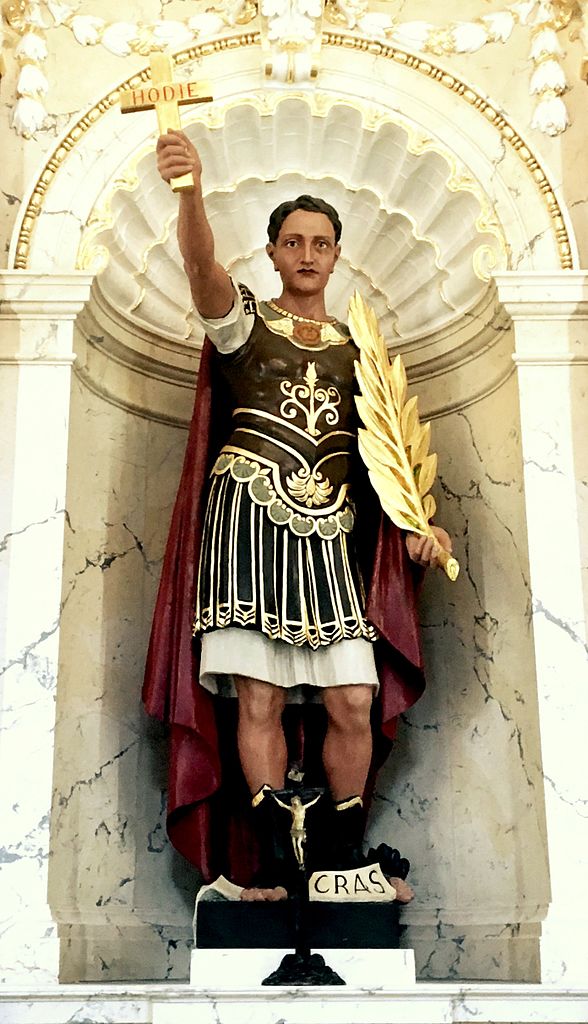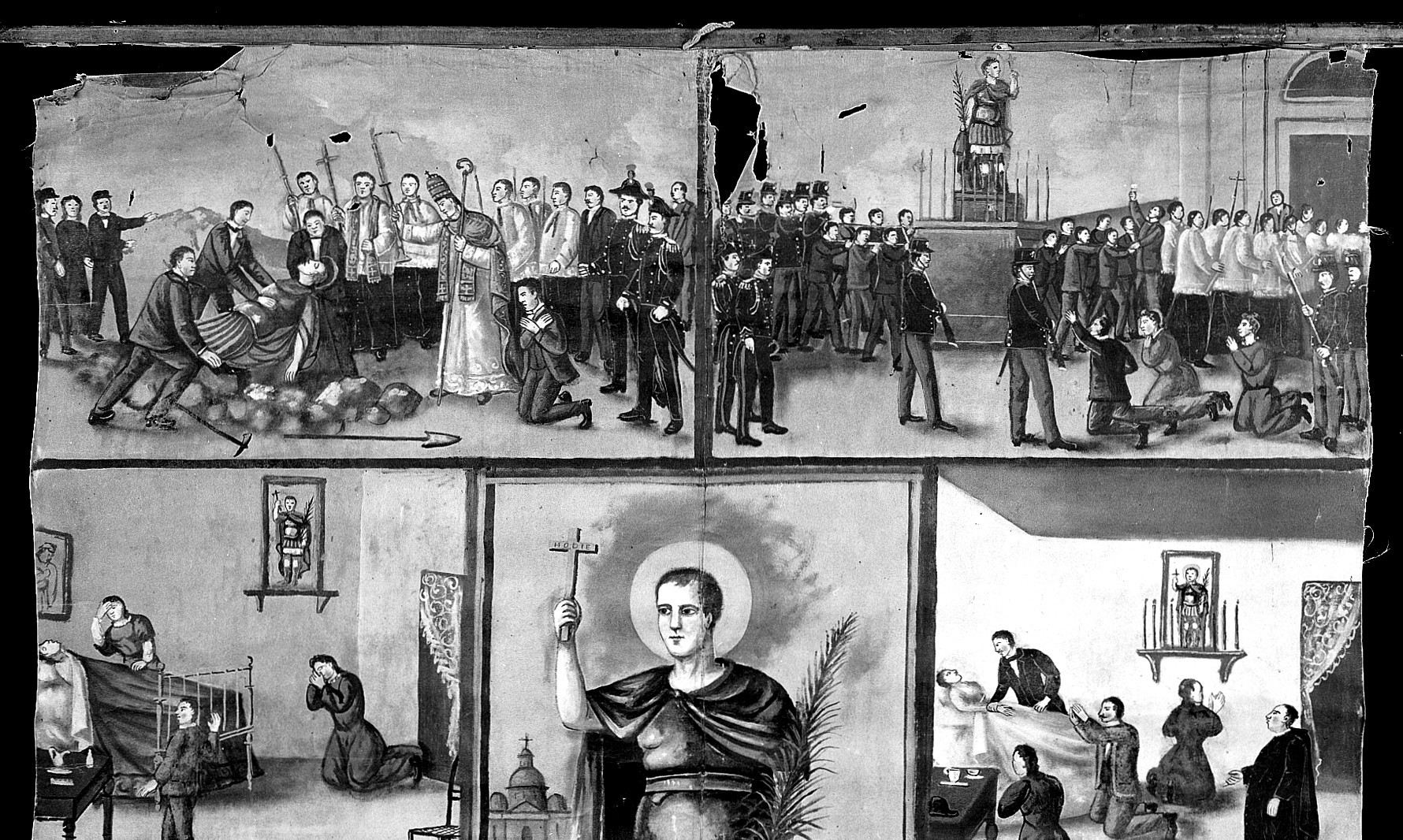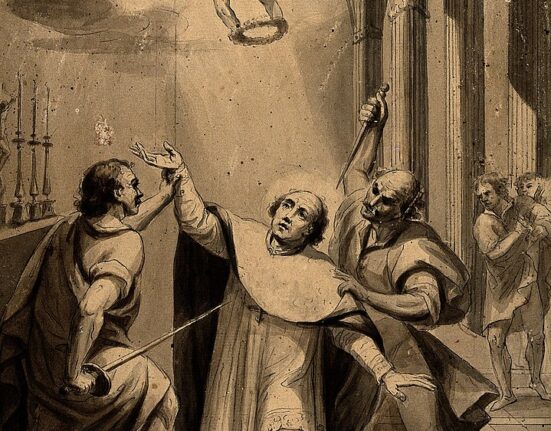I previously wrote about Saint Guinefort, a dog who became an unofficial local saint after a folk tale emerged surrounding his heroic deeds. While studying Saint Guinefort, I stumbled upon a little-known saint by the name of Saint Expeditus. There is little information available regarding this character, but what I could find is quite amusing.
Saint Expeditus is described as the patron saint of emergencies and situations requiring haste. If the word play of that fact sticks out to you, then you’re on the right track. The character of “Expeditus” is first recorded in the Hieronymian Martyrology, which originates from as early as about 400 AD and lists known Christian martyrs in calendar order. According to this text, Expeditus was a fourth century soldier who was slain during the Diocletian persecution. Expeditus was a fairly common Roman name whose Latin meaning refers to an infantry soldier who travels light. (1)
So far, the story of Expeditus makes as much sense as any. He was a Christian martyr who was persecuted and died; this is standard fare for saints. The thing is, there isn’t any other record of Expeditus or of his veneration that supports this story. Expeditus doesn’t pop up again at all for over a thousand years. The next time Expeditus’s name comes into play is the eighteenth century. (2)
More Forgotten History: Franklin: The U.S. State That Never Was
Expeditus Arrives
Now, the next appearance of Expeditus seems, to me, to be pure folklore. While it is fascinating nevertheless, pretty much every detail surrounding Expeditus which does not originate from the Hieronymian Martyrology is anecdotal at best. Regardless, the stories that follow are crucial to understanding the veneration of this mysterious figure.
In 1781, so the legend goes, a parcel containing the remains and relics of a little-known saint were delivered to a French convent. The package had no markings indicating the name or details of the saint interred within, however the box had been stamped with a shipping label that read “EXPEDITE” due to the urgent need to deliver the holy artifacts within. The nuns who received the package, seeing no other label by which to identify the saint, assumed that “EXPEDITE” must be his name. In a story that bears a slight resemblance to the indigenous “Cargo Cults” which arose during World War II, Saint Expeditus became the subject of veneration due to the misunderstanding of a shipping label. (3)

Saint of Misunderstandings
There are, predictably, issues with this narrative. For one, versions of this story exist in other locations as well. In New Orleans, Louisiana, Expeditus is referred to as the French “Expedit” and is said to have been named via the same misunderstanding as the above version. The New Orleans variant of Expeditus has been assimilated into Creole folklore. Syncretic traditions like Voodoo combine Catholic iconography with ritual traditions focused on ancestors, spirits, and ceremonies. In many of these traditions, St. Expeditus has become a popular figure. (4)
Another issue with the misunderstood shipping label theory of St. Expeditus is the simple fact that his name predates this story. As we previously discussed, Expeditus appears in a millennia-old martyrology, which would mean that the shipping label theory would have to be a pretty significant coincidence. The figure of Saint Expeditus also appears as a patron against procrastination prior to the 1781 date which is named as the date of the shipping label misunderstanding. (5)
More Fascinating History: The Salton Sea: How a Desert Resort Became an Abandoned Wasteland
The Forgotten Centurion
It seems quite obvious to me that, regardless of whether the misunderstanding ever did occur, the legend of Expeditus the centurion predates it significantly. So who was this soldier? One legend states that when Expeditus decided to convert to Christianity, Satan appeared before him in the form of a murder of crows. The crows cawed at him and repeated the Latin word for ‘tomorrow.’ Undeterred by Satan’s attempt to seduce him into procrastination, Expeditus stomped on the crows and declared “I will become a Christian today!” (6)
Though he is usually depicted as a Roman soldier holding a palm frond, some sources indicate that Expeditus was an Armenian soldier in the service of the Legio XII Fulminata. Beyond this, there are no real details about the largely forgotten saint. The feast of Saint Expeditus is ostensibly held on the 19th of April, although it is scarcely observed. Named as patron of emergencies, urgency, hackers, and revolutionaries, the role of Expeditus within Catholicism is as murky as the hagiography, or lack thereof, regarding this figure. (7)
More Mysterious History: Locusta: Who was Emperor Nero’s Poisoner?






